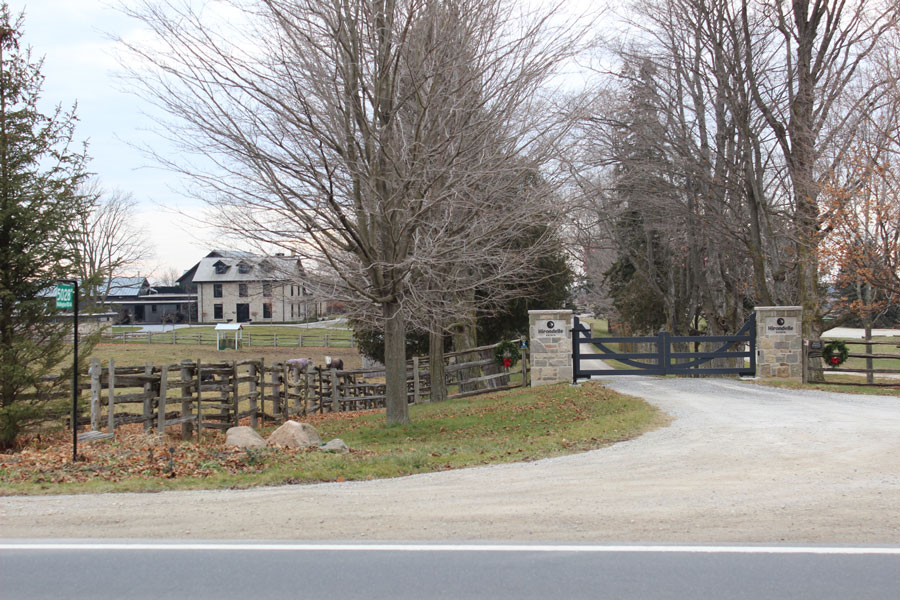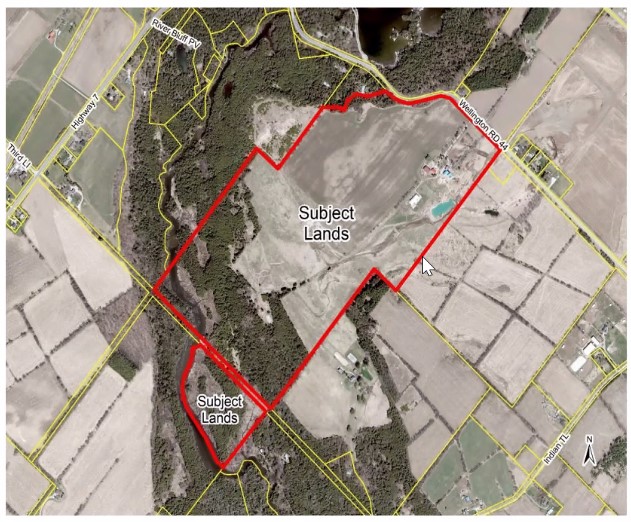BRUCEDALE – Seasonal special events with up to 75 guests will be permitted at an agricultural property just south of the Rockwood Conservation Area and less than a kilometre from Rockwood’s urban boundary.
Guelph/Eramosa councilors voted unanimously to approve the rezoning of the Wellington Road 44 property at a public meeting on Dec. 11.
The site is known as Hirondelle Estate and “has been proudly owned by Sabine Viet since 2018,” according to a website about the property.
The rezoning will allow the owners to convert a decommissioned barn into an event venue to host rural education events, professional gatherings, rural events such as food festivals and book readings, and special celebrations including weddings.
County of Wellington planner Meagan Ferris told council, “The township zoning bylaw does allow farm businesses, however it does not specifically allow businesses that are not directly linked to the farming operation, or event venues, as of right. Hence the need for [rezoning].”
Public concerns
One person expressed concerns on Dec. 11, and four people spoke against the application during the first public meeting on Oct. 3, 2022. Three people submitted written comments after the public meeting last year.
Concerns from the public include increased traffic, noise pollution, use of trails, and setting a precedent for non-residents to buy and apply to rezone land in prime agricultural areas.
Ferris said she has done “quite an extensive review of these concerns.”
Members of the public also asked dozens of questions regarding the rezoning, and councillor Steven Liebig said “most if not all the questions were answered to a high level of professionalism from the county and local staff.”
Rezoning
The rezoning permits events to occur on the property up to three times per week, including in the outdoor space beside the barn, and allows parking on-site for up to 25 vehicles.
The barn is not heated or cooled, and events will only be permitted between May 1 and Oct. 31.
The rezoning “provides an opportunity for a farm property to introduce a small-scale farm business … to diversify and supplement their income,” states Ferris’ report to council.
She noted that limiting events and the number of guests is a way to “ensure the use remains secondary to the principal agricultural use of the property.”
No commercial kitchen or food trucks are permitted – food will be provided by caterers. A new septic system will be installed as well as possible temporary washrooms, and an existing well will service the buildings.
Trails
The rezoning will also permit guests to use property trails for nature walks, snow-shoeing, cross-country skiing, and permit kayaking in the river and fishing in the pond on-site.
Though public concerns were raised about clear cutting taking place to create the trails, the report states “Clear cutting did not occur. These trails were created as part of a forest management plan.”
The neighbour closest to the trails spoke to council on Dec. 11, after submitting multiple written concerns. His primary objection is guests using the trails, which are located a few hundred metres from his home.
Councillor Corey Woods said while he emphasizes with the concerns, “we do have to recognize that people are allowed to do stuff on their property that doesn’t need council approval” and is more disruptive than the proposed trail use, such as dirt biking or hunting coyotes and foxes.
“Not that I necessarily support the trails – but I’m not against the trails either.”
On-farm diversified uses
The almost 80 hectare (200 acre) site is an active farm with a two-storey detached home, a coach house, a livestock barn, and the decommissioned barn.
The property also includes significant woodlands and wetlands, and the Eramosa River runs through it. The County of Wellington designates the land as prime agriculture, core greenlands and greenlands.
The planned use for the property is considered an on-farm diversified use (OFDU), according to the county’s report. The rezoning limits the OFDU area to 0.8 hectares (two acres), including the decommissioned barn, outdoor events area, new access, parking, landscaping and new services including septic system.
“This exceeds the township’s zoning permissions but is less than the recommended value in the provincial guidelines,” the report states.
The agricultural use on the property includes growing buckwheat, rye and garlic, as well as boarding horses. The applicant plans to introduce new crops and livestock to the property in the future.
County staff consider the proposal to open an event space “an opportunity to maintain the agricultural use, but also support opportunities for a unique agri-tourism use,” the report states.
Surrounding lands include agriculture, rural residential, aggregate and the Rockwood Conservation Area.
The rezoning application has been reviewed by the township consulting engineers (R.J Burnside) and officials with the township, county, province, Grand River Conservation Authority (GRCA) and Wellington Source Water Protection – and none had any objection to the proposal.
Traffic and road safety
Originally, the applicants intended to use the existing driveway for the event venue, but the Wellington County roads department flagged this as a concern due to poor sight lines near a bend in the road.
So the applicants proposed a new driveway and entrance about 50 metres south of the original, which has been reviewed by the county. A permit for the new entrance is required to address final design details.
The county will also investigate partially paving the road’s west shoulder for right turns.
“Overall, [the county] has accepted that the proposal will not have a major impact on the function of the road,” the report states.

A new driveway will be built at a Guelph/Eramosa farm to provide a safer entrance for guests. Photo by Robin George
Excess noise
A noise control feasibility study based on how sound from the proposed use would travel to the neighbouring home at 5015 Wellington Road 44 was prepared by SS Wilson Associated.
The study found “the use meets the criteria established by the Ministry of Environment and Climate Change, that any non-stationary noises like a PA system will not be clearly audible, and overall concluded that no mitigation measures were required,” according to the county report.
“It doesn’t mean that someone will never hear anything,” Ferris clarified – “it’s almost an exercise of determining how audible something will be.”
It also specifies that amplified music or other sound is not permitted after 11pm. Guelph/Eramosa noise and zoning bylaws are enforced based on complaints.
Monitoring
Public concerns also include how the property use would be monitored.
While councillors briefly discussed the possibility of monitoring the site, they agreed to stick with the complaint-based approach.
“I don’t think this deserves any special treatment,” said councillor Bruce Dickieson. “Its a complaint-driven mechanism now and I think until it’s a big problem I think we leave it that way.”
Property owner
Though the property is not the owner’s primary residence, it is considered Viet’s “second home” and “will become her primary residence once her boys, who are in high school, graduate,” according to the township’s responses to public comments.
Viet manages and participates in the farming of the property and will manage the on-farm diversified use.
A representative of Viet’s legal council, Patrick Harrington, told council on Dec. 11 Viet is in “full support” of all recommendations.
Liebig noted “the property owners are willing to work with people around them instead of against them, which is a whole new level of professionalism and excellence.”
Next steps
The event venue will not be permitted until the site plan is approved and the holding provision is removed, to address final technical details, including;
– an environmental review of trails by the GRCA;
– mitigation requirements from noise and traffic study;
– an entrance permit from the county;
– outstanding items regarding on-site servicing; and
– parking, garbage and snow removal.
Ferris described the holding provision as “quite robust.”
According to the county planning report, “comments from the public have been considered and addressed” and the rezoning is appropriate and “consistent with the provincial guidelines for this use.”




